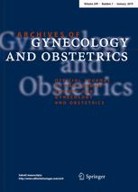Authors:
Laganà AS, Vitagliano A, Noventa M, Ambrosini G, D’Anna R
Abstract
Purpose: To evaluate whether oral myo-inositol supplementation (MI) is able to reduce the amount of gonadotropins (GA) and the length of controlled ovarian hyperstimulation (SL) in both Polycystic Ovarian Syndrome (PCOS) and non-PCOS women undergoing in vitro fertilization (IVF). Methods: We performed a systematic review (PROSPERO ID: CRD42017069439) of randomized controlled trials (RCTs). We searched articles published in English between January 1985 to August 2017, using the combination of the Medical Subject Headings “Inositol” with “Ovulation Induction”, “follicle-stimulating hormone, human, with HCG C-terminal peptide”, “Reproductive Techniques, Assisted”, and “Fertilization in Vitro”. We collected data about GA and SL comparing MI to no treatment or D-Chiro-Inositol (DCI) supplementation (controls). A subgroup analysis was performed to evaluate selected outcomes in PCOS and non-PCOS women. Results: We included 8 studies embedding 812 participants. We found a reduction in GA (p < 0.00001) and SL (p = 0.0007) in patients receiving MI with respect to controls. MI was effective in both PCOS (p < 0.00001) and non-PCOS women (p = 0.02) in reducing GA; conversely, MI supplementation decreased the SL only in PCOS women (p < 0.00001). Conclusion: During IVF, MI is effective in both PCOS and non-PCOS women in saving gonadotropins, but reduces efficiently SL only in PCOS women.

